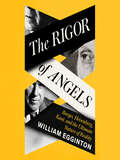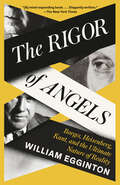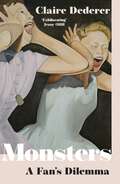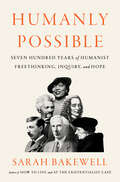Title search results
Showing 1 - 4 of 4 items

The rigor of angels: Borges, heisenberg, kant, and the ultimate nature of reality
By William Egginton. 2023
DAISY audio (Direct to player), DAISY audio (Zip)
Philosophy, Literature biography, Biography
Human-narrated audio
The New York Times Book Review Editors' Choice • A poet, a physicist, and a philosopher explored the greatest enigmas…
in the universe—the nature of free will, the strange fabric of the cosmos, the true limits of the mind—and each in their own way uncovered a revelatory truth about our place in the world "[A] mind-expanding book. . . . Elegantly written." — The New York Times "A remarkable synthesis of the thoughts, ideas, and discoveries of three of the greatest minds that our species has produced." —John Banville, The Wall Street Journal Argentine poet Jorge Luis Borges was madly in love when his life was shattered by painful heartbreak. But the breakdown that followed illuminated an incontrovertible truth—that love is necessarily imbued with loss, that the one doesn’t exist without the other. German physicist Werner Heisenberg was fighting with the scientific establishment on the meaning of the quantum realm’s absurdity when he had his own epiphany—that there is no such thing as a complete, perfect description of reality. Prussian philosopher Immanuel Kant pushed the assumptions of human reason to their mind-bending conclusions, but emerged with an idea that crowned a towering philosophical system—that the human mind has fundamental limits, and those limits undergird both our greatest achievements as well as our missteps. Through fiction, science, and philosophy, the work of these three thinkers coalesced around the powerful, haunting fact that there is an irreconcilable difference between reality "out there" and reality as we experience it. Out of this profound truth comes a multitude of galvanizing ideas: the notion of selfhood, free will, and purpose in human life; the roots of morality, aesthetics, and reason; and the origins and nature of the cosmos itself. As each of these thinkers shows, every one of us has a fundamentally incomplete picture of the world. But this is to be expected. Only as mortal, finite beings are we able to experience the world in all its richness and breathtaking majesty. We are stranded in a gulf of vast extremes, between the astronomical and the quantum, an abyss of freedom and absolute determinism, and it is in that center where we must make our home. A soaring and lucid reflection on the lives and work of Borges, Heisenberg, and Kant, The Rigor of Angels movingly demonstrates that the mysteries of our place in the world may always loom over us—not as a threat, but as a reminder of our humble humanity
The Rigor of Angels: Borges, Heisenberg, Kant, and the Ultimate Nature of Reality
By Null William Egginton. 2023
Braille (Contracted), Electronic braille (Contracted), DAISY Audio (Direct to Player), DAISY Audio (Zip), DAISY text (Direct to player), DAISY text (Zip), Word (Zip), ePub (Zip)
Literature biography, Biography, Philosophy
Synthetic audio, Automated braille
A NEW YORK TIMES AND NEW YORKER BEST BOOK OF THE YEAR • A poet, a physicist, and a philosopher explored…
the greatest enigmas in the universe—the nature of free will, the strange fabric of the cosmos, the true limits of the mind—and each in their own way uncovered a revelatory truth about our place in the world&“[A] mind-expanding book. . . . Elegantly written.&” —The New York Times&“A remarkable synthesis of the thoughts, ideas, and discoveries of three of the greatest minds that our species has produced.&” —John Banville, The Wall Street JournalArgentine poet Jorge Luis Borges was madly in love when his life was shattered by painful heartbreak. But the breakdown that followed illuminated an incontrovertible truth—that love is necessarily imbued with loss, that the one doesn&’t exist without the other. German physicist Werner Heisenberg was fighting with the scientific establishment on the meaning of the quantum realm&’s absurdity when he had his own epiphany—that there is no such thing as a complete, perfect description of reality. Prussian philosopher Immanuel Kant pushed the assumptions of human reason to their mind-bending conclusions, but emerged with an idea that crowned a towering philosophical system—that the human mind has fundamental limits, and those limits undergird both our greatest achievements as well as our missteps.Through fiction, science, and philosophy, the work of these three thinkers coalesced around the powerful, haunting fact that there is an irreconcilable difference between reality &“out there&” and reality as we experience it. Out of this profound truth comes a multitude of galvanizing ideas: the notion of selfhood, free will, and purpose in human life; the roots of morality, aesthetics, and reason; and the origins and nature of the cosmos itself. As each of these thinkers shows, every one of us has an incomplete picture of the world. But it's only as mortal, finite beings are we able to experience the world in its richness and breathtaking majesty. A soaring and lucid reflection on the lives and work of Borges, Heisenberg, and Kant, The Rigor of Angels movingly demonstrates that the mysteries of our place in the world may always loom over us—not as a threat, but as a reminder of our humble humanity.
Monsters: A Fan’s Dilemma
By Claire Dederer. 2023
Braille (Contracted), Electronic braille (Contracted), DAISY Audio (Direct to Player), DAISY Audio (Zip), DAISY text (Direct to player), DAISY text (Zip), Word (Zip), ePub (Zip)
Arts and entertainment, Criticism, Philosophy
Synthetic audio, Automated braille
'An exhilarating, shape-shifting exploration of the perilous boundaries between art and life' JENNY OFFILL'An incredible book, the best work of…
criticism I have read in a very long time' NICK HORNBY'Wise and bold and full of the kind of gravitas that might even rub off' LISA TADDEOA passionate, provocative and blisteringly smart interrogation of how we experience art in the age of #MeToo, and whether we can separate an artist's work from their biography.What do we do with the art of monstrous men? Can we love the work of Roman Polanski and Michael Jackson, Hemingway and Picasso? Should we love it? Does genius deserve special dispensation? What makes women artists monstrous? And what should we do with beauty, and with our unruly feelings about it?Claire Dederer explores these questions and our relationships with the artists whose behaviour disrupts our ability to understand the work on its own terms. She interrogates her own responses and behaviour, and she pushes the fan, and the reader, to do the same. Morally wise, deeply considered and sharply written, Monsters gets to the heart of one of our most pressing conversations.'A blisteringly erudite and entertaining read . . . It's a book that deserves to be widely read and will provoke many conversations' NATHAN FILER'Fascinating . . . Dederer poses so many topical questions, plays with so many pertinent ideas, that I'm still thinking about this book long after I finished it' CLAIRE FULLER
Humanly Possible: Seven Hundred Years of Humanist Freethinking, Inquiry, and Hope
By Sarah Bakewell. 2023
Braille (Contracted), Electronic braille (Contracted), DAISY Audio (Direct to Player), DAISY Audio (Zip), DAISY text (Direct to player), DAISY text (Zip), Word (Zip), ePub (Zip)
Biography, Philosophy
Synthetic audio, Automated braille
The bestselling, prizewinning author of How to Live and At the Existentialist Café explores 700 years of writers, thinkers, scientists…
and artists, all trying to understand what it means to be truly human. If you are reading this, it&’s likely you already have some affinity with humanism, even if you don&’t think of yourself in those terms. You may be drawn to literature and the humanities. You may prefer to base your moral choices on fellow-feeling and responsibility to others rather than on religious commandments. Or you may simply believe that individual lives are more important than grand political visions or dogmas.If any of these apply, you are part of a long tradition of humanist thought, and you share that tradition with many extraordinary individuals through history who have put rational enquiry, cultural richness, freedom of thought and a sense of hope at the heart of their lives.Humanly Possible introduces us to some of these people, as it asks what humanism is and why it has flourished for so long, despite opposition from fanatics, mystics and tyrants. It is a book brimming with ideas, personalities and experiments in living – from the literary enthusiasts of the fourteenth century to the secular campaigners of our own time, from Erasmus to Esperanto, from anatomists to agnostics, from Christine de Pizan to Bertrand Russell, and from Voltaire to Zora Neale Hurston. It takes us on an irresistible journey, and joyfully celebrates open-mindedness, optimism, freedom and the power of the here and now—humanist values which have helped steer us through dark times in the past, and which are just as urgently needed in our world today. The bestselling, prizewinning author of How to Live and At the Existentialist Café explores 700 years of writers, thinkers, scientists and artists, all trying to understand what it means to be truly human.